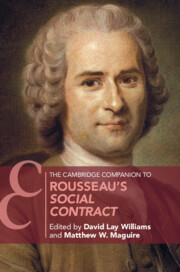Book contents
- The Cambridge Companion to Rousseau’s Social Contract
- Series page
- The Cambridge Companion to Rousseau’s Social Contract
- Copyright page
- Dedication
- Contents
- Contributors
- Acknowledgments
- 1 Introduction
- 2 “Every Legitimate Government Is Republican”
- 3 What If There Is No Legislator?
- 4 Rousseau’s Republican Citizenship
- 5 Rousseau’s Negative Liberty
- 6 Rousseau’s Ancient Ends of Legislation
- 7 Property and Possession in Rousseau’s Social Contract
- 8 Political Equality among Unequals
- 9 On the Primacy of Peoplehood
- 10 Rousseau on Voting and Electoral Laws
- 11 On the Possibility of a Modern Republic
- 12 Rousseau’s Case against Democracy
- 13 Rousseau’s Dilemma, or “Of Civil Religion”
- 14 Entreating the Political
- 15 Civil Religion and Political Unity
- Bibliography
- Index
- Series page
13 - Rousseau’s Dilemma, or “Of Civil Religion”
Published online by Cambridge University Press: 28 March 2024
- The Cambridge Companion to Rousseau’s Social Contract
- Series page
- The Cambridge Companion to Rousseau’s Social Contract
- Copyright page
- Dedication
- Contents
- Contributors
- Acknowledgments
- 1 Introduction
- 2 “Every Legitimate Government Is Republican”
- 3 What If There Is No Legislator?
- 4 Rousseau’s Republican Citizenship
- 5 Rousseau’s Negative Liberty
- 6 Rousseau’s Ancient Ends of Legislation
- 7 Property and Possession in Rousseau’s Social Contract
- 8 Political Equality among Unequals
- 9 On the Primacy of Peoplehood
- 10 Rousseau on Voting and Electoral Laws
- 11 On the Possibility of a Modern Republic
- 12 Rousseau’s Case against Democracy
- 13 Rousseau’s Dilemma, or “Of Civil Religion”
- 14 Entreating the Political
- 15 Civil Religion and Political Unity
- Bibliography
- Index
- Series page
Summary
Rousseau’s chapter “Of Civil Religion” has perplexed readers ever since the publication of the Social Contract. For the book’s earliest readers, the chapter was a sign of its author’s theological heresy even if contemporary readers are likely to take a more benign view of Rousseau’s intention. The question I pose is why the formula for the laws and institutions set out in the earlier parts of the Social Contract requires additional support in the form of the religious beliefs examined in the penultimate chapter. I want to suggest that this chapter represents a nod in the direction of Rousseau’s political realism in his acknowledgement that civil religion remains an indispensable part of the education of republican citizens.
- Type
- Chapter
- Information
- The Cambridge Companion to Rousseau's Social Contract , pp. 273 - 292Publisher: Cambridge University PressPrint publication year: 2024

